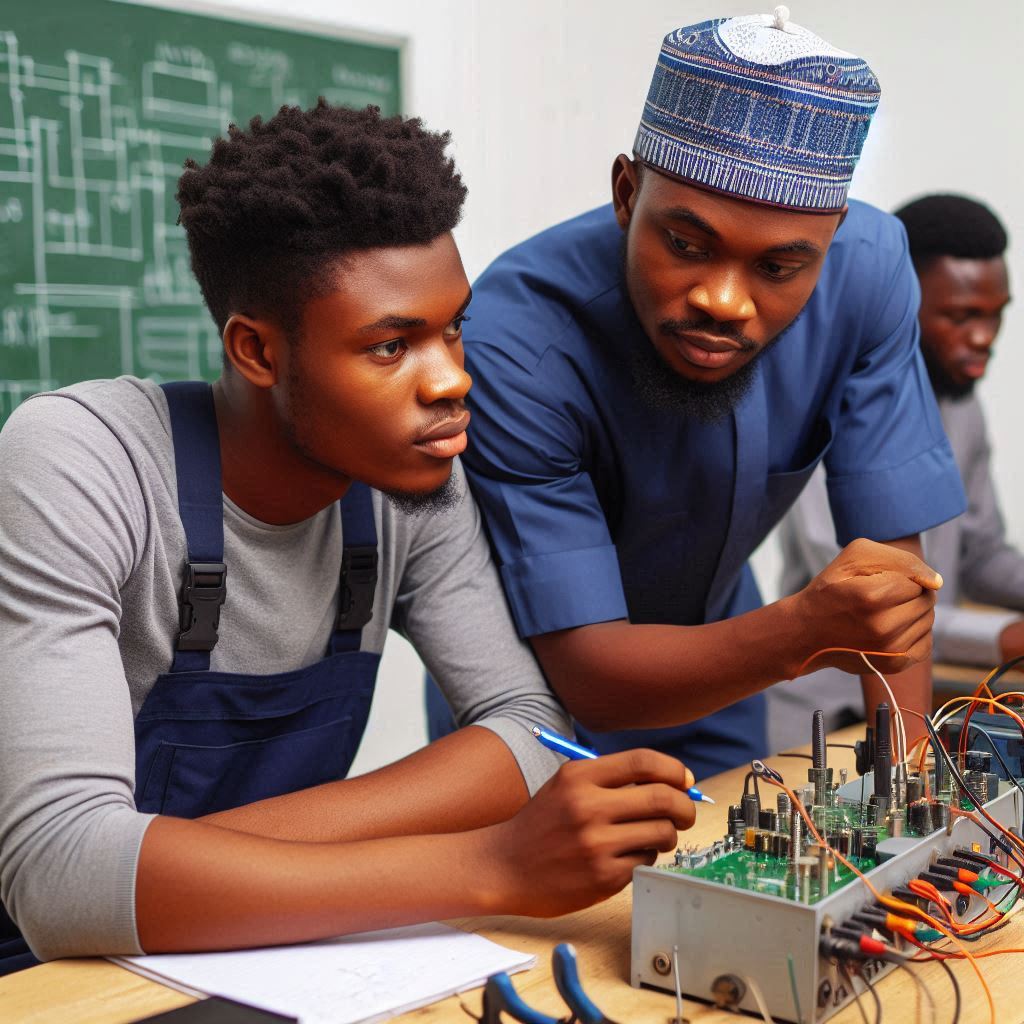Introduction
Definition of Technical Education
Technical education involves training individuals in practical and applied sciences. It focuses on equipping students with skills for specific trades, crafts, and careers in technical fields.
This form of education encompasses both theoretical instruction and hands-on practice. By integrating these elements, technical education prepares individuals for the workforce, emphasizing real-world applications.
Importance of Technical Education in National Development
Technical education plays a crucial role in national development. It provides a skilled workforce essential for economic growth. These skills are vital for industries such as manufacturing, construction, and technology.
A well-trained workforce can drive innovation, improve productivity, and enhance the overall competitiveness of a country.
Driving Economic Growth
Countries with robust technical education systems tend to experience significant economic growth. Skilled workers contribute to various sectors, boosting productivity and efficiency.
In Nigeria, technical education can address unemployment by providing job-ready skills to youths. This reduces dependency on white-collar jobs and promotes entrepreneurship.
Enhancing Industrial Competitiveness
Technical education enhances a nation’s industrial competitiveness. Skilled technicians and engineers are necessary for maintaining and advancing industrial activities.
Nigeria’s growing industries, like oil and gas, rely heavily on technical expertise. Without a steady supply of skilled workers, these industries would struggle to thrive.
Promoting Innovation and Technological Advancement
Innovation and technological advancement are key drivers of development. Technical education fosters an environment where innovation can flourish.
By training individuals in the latest technologies, technical education ensures that Nigeria remains at the forefront of technological advancements. This, in turn, attracts foreign investments and creates new job opportunities.
Reducing Youth Unemployment
Youth unemployment is a significant challenge in Nigeria. Technical education offers a solution by equipping young people with employable skills.
Graduates of technical programs are often ready to enter the workforce immediately. This reduces the time and resources spent on additional training by employers, making them more desirable hires.
Supporting Sustainable Development
Sustainable development requires a balance between economic growth and environmental stewardship. Technical education promotes sustainable practices in industries by teaching efficient and environmentally friendly techniques.
This ensures that economic development does not come at the cost of environmental degradation.
In summary, technical education is vital for Nigeria’s national development. It provides the skilled workforce necessary for economic growth, enhances industrial competitiveness, and promotes innovation.
Additionally, it helps reduce youth unemployment and supports sustainable development.
By investing in technical education, Nigeria can harness the potential of its youth, drive industrial growth, and achieve sustainable development goals.
Lack of Adequate Funding in Nigerian Technical Education
In Nigeria, one of the foremost challenges plaguing technical education is the persistent issue of inadequate funding.
This critical problem permeates every aspect of technical institutions, affecting both their operational capabilities and their ability to deliver quality education.
Government Budget Allocation to Technical Education
Government budget allocation to technical education in Nigeria has been consistently insufficient.
Despite the importance of technical skills in national development, funding for technical institutions receives a disproportionately small share of the overall education budget.
This disparity reflects broader systemic issues in prioritizing technical education within national policies and budgetary frameworks.
Effects of Inadequate Funding on Quality of Education
The effects of inadequate funding on the quality of technical education are profound and multifaceted. Firstly, it directly impacts the availability of qualified faculty and staff.
Salaries, research grants, and professional development opportunities suffer, leading to a brain drain as talented educators seek better prospects elsewhere.
Secondly, insufficient funding cripples the institutions’ ability to maintain up-to-date facilities and equipment.
Technical education relies heavily on practical training and modern equipment, yet many institutions struggle with outdated tools or a lack thereof.
This directly hampers students’ ability to gain hands-on experience and proficiency in their chosen fields.
Effects of Inadequate Funding on Infrastructure
Infrastructure in technical institutions is another casualty of inadequate funding. Basic amenities such as classrooms, laboratories, and libraries are often substandard or overcrowded.
The maintenance of existing infrastructure becomes neglected, exacerbating deterioration and safety concerns.
Moreover, inadequate funding limits investments in technological advancements and modernization efforts.
This perpetuates a cycle where students are trained using obsolete methods and technologies, leaving them ill-prepared for the demands of modern industries.
The Cycle of Disadvantage
The cycle of disadvantage caused by insufficient funding is profound. Graduates from underfunded institutions face skepticism from employers about their practical skills and knowledge.
This diminishes the value of technical education in the eyes of stakeholders and the public, further perpetuating the cycle of neglect.
Addressing the issue of funding in Nigerian technical education requires a comprehensive approach. Policymakers must prioritize allocating adequate resources to technical institutions, reflecting their pivotal role in national development.
This includes not only increasing budgetary allocations but also ensuring transparent and efficient utilization of funds.
Furthermore, partnerships with private sector entities and international organizations can supplement government efforts, providing additional resources and expertise to enhance the quality of technical education.
In summary, while Nigeria’s technical education sector faces numerous challenges, the lack of adequate funding stands out as a fundamental issue.
Rectifying this requires concerted efforts from policymakers, educators, and stakeholders to secure sustainable investments and foster an environment conducive to quality technical education.
Only then can Nigeria harness its full potential in developing skilled professionals and driving economic growth.
Read: Nigerian Educational Technology Associations
Shortage of Qualified Technical Teachers
In Nigerian technical education, a critical challenge persists: the shortage of qualified teachers. This scarcity spans various technical disciplines, from engineering to vocational trades.
The problem exacerbates the already strained educational system, affecting both quality and depth of instruction.
Qualified technical educators possess not only subject matter expertise but also pedagogical skills crucial for effective teaching.
However, many institutions struggle to attract and retain such instructors. This scarcity results in larger class sizes and overburdened teachers, compromising personalized instruction.
Lack of Specialized Training for Technical Educators
Compounding the issue is the lack of specialized training for technical educators. Teaching technical subjects requires not only academic knowledge but also practical experience and updated skills.
Without adequate training programs tailored to technical education, educators may struggle to impart relevant, current knowledge to students.
Specialized training should encompass both theoretical foundations and practical applications. It should also incorporate emerging technologies and industry trends to prepare educators adequately.
However, such programs are often underfunded or nonexistent in many educational institutions across Nigeria.
Impact of Teacher Shortage on Students’ Learning Experience
The repercussions of teacher shortage reverberate through students’ learning experiences.
Overcrowded classrooms diminish individual attention and mentorship opportunities. This environment hampers students’ ability to grasp complex technical concepts and develop practical skills.
Moreover, inadequate teacher-student ratios strain educators, limiting their ability to provide timely feedback and guidance.
This deficiency further impedes students’ learning trajectories and overall academic performance. As a result, many graduates may lack the competencies required by the evolving job market.
Addressing the Challenges
Addressing these challenges requires multifaceted approaches. Firstly, increasing incentives for technical educators can attract and retain qualified professionals.
Enhancing salaries, benefits, and career advancement opportunities can incentivize skilled individuals to pursue teaching careers.
Secondly, establishing robust, ongoing professional development programs is crucial. These programs should focus on enhancing pedagogical skills, integrating new technologies, and fostering industry partnerships.
Collaboration with businesses can ensure curricula relevance and expose educators to real-world applications.
Thirdly, government support is essential in allocating adequate resources to technical education. This includes funding for infrastructure, instructional materials, and comprehensive teacher training initiatives.
Policy reforms should prioritize technical education as a strategic investment in national development.
In a nutshell, addressing the shortage of qualified technical teachers in Nigeria is imperative for the advancement of technical education.
By investing in teacher training, improving working conditions, and fostering partnerships, educational institutions can enhance learning outcomes and equip students with essential skills for future success.
The journey towards overcoming these challenges demands collaborative efforts from educators, policymakers, and industry stakeholders to build a robust technical education ecosystem.
Read: Curriculum Studies Scholarships in Nigeria
Outdated curriculum and teaching methods
One of the critical challenges facing technical education in Nigeria is the issue of outdated curriculum and teaching methods.
The world is evolving rapidly, especially in the field of technology and engineering, and it is imperative that educational institutions keep up with these changes.
Unfortunately, many technical schools in Nigeria are still using outdated curricula that do not align with current industry standards.
It is essential to reform the curriculum to ensure that students are equipped with the most relevant and up-to-date knowledge and skills needed to succeed in the modern workforce.
This includes incorporating new technologies, methodologies, and trends into the curriculum to meet the demands of the industry.
Importance of hands-on learning and practical experience in technical education
Moreover, there is a growing recognition of the importance of hands-on learning and practical experience in technical education.
Many technical subjects require practical skills that cannot be acquired through theoretical teachings alone.
By providing students with hands-on experience, they can develop a deeper understanding of the subject matter and gain valuable skills that will be useful in their future careers.
Hands-on learning allows students to apply their theoretical knowledge in real-world situations, which can enhance their problem-solving abilities and critical thinking skills.
It also helps students develop a sense of confidence and independence as they learn to work on projects independently and collaborate with their peers.
Incorporating practical experiences into the curriculum can also lead to a more engaging and stimulating learning environment.
Students are more likely to be motivated and interested in their education when they can see the direct application of their studies in real-life situations.
This can lead to higher retention rates and better academic performance among technical students.
Overall, addressing the issue of outdated curriculum and teaching methods in Nigerian technical education is crucial for the future success of students and the nation as a whole.
By reforming the curriculum to align with industry standards and emphasizing hands-on learning, we can better prepare students for the challenges and opportunities of the modern workforce.
Read: Practical Training in Counsellor Education Programs

Limited Access to Modern Equipment and Technology
In Nigerian technical education, a pervasive challenge is the limited access to modern equipment and technology.
Technical institutions struggle with acquiring and maintaining up-to-date equipment due to various factors such as financial constraints, bureaucratic processes, and infrastructural deficiencies.
Challenges Faced by Technical Institutions
Acquiring modern equipment is hindered by budget limitations and the high cost of state-of-the-art technology. Many institutions rely on outdated machinery, which hampers practical training and skill development.
Moreover, bureaucratic red tape often delays procurement processes, further exacerbating the problem.
Financial Constraints and Budget Limitations
Financial resources allocated to technical education are often insufficient to cover the costs of modern equipment. This leads to a reliance on outdated technology that fails to meet current industry standards.
As a result, students are trained on equipment that does not prepare them adequately for real-world challenges.
Transform Your Career with Expert Guidance
Get personalized mentorship consulting that’s tailored to your unique path. Our expert advice is actionable and exclusive.
Get StartedMaintenance Issues and Infrastructural Deficiencies
Even when equipment is procured, maintenance becomes a significant issue. Technical institutions struggle to keep machinery in optimal condition due to a lack of skilled maintenance personnel and inadequate funding for repairs.
This results in frequent breakdowns and prolonged downtime, impacting students’ learning experiences.
Effects of Outdated Technology on Skills Development
The use of obsolete technology hampers students’ ability to develop relevant skills demanded by modern industries.
Employers seek candidates proficient in the latest tools and techniques, but Nigerian graduates often lack exposure to such advancements.
This skills gap reduces their competitiveness in the job market and undermines the quality of technical education.
Impact on Competitiveness and Industry Alignment
In a globalized economy driven by technological advancements, Nigeria’s technical graduates face challenges in competing internationally.
Industries require skilled professionals capable of leveraging cutting-edge technology to drive innovation and efficiency.
Without access to modern equipment, graduates struggle to meet these expectations, limiting their career prospects and the country’s overall industrial growth.
Addressing the issue of limited access to modern equipment and technology is crucial for revitalizing Nigerian technical education.
Government intervention, increased funding, streamlined procurement processes, and partnerships with industry can mitigate these challenges.
By investing in up-to-date resources, institutions can enhance students’ skills development, improve their competitiveness, and align educational outcomes with industry needs.
Only through concerted efforts can Nigeria’s technical education sector overcome these obstacles and thrive in the 21st-century economy.
Read: Professional Certifications in Business Education
Perception of Technical Education as Inferior
In Nigeria, technical education often faces the perception of being inferior to academic education. This bias is deeply rooted in societal attitudes that prioritize traditional academic paths over technical skills development.
Many parents and students believe that pursuing technical education implies a lack of intelligence or ambition, perpetuating stereotypes that devalue technical professions.
Societal Attitudes Towards Technical Education
Societal attitudes towards technical education in Nigeria are largely shaped by cultural norms and historical perspectives. There is a prevalent belief that success is primarily achieved through white-collar professions requiring university degrees.
As a result, technical education is often viewed as a fallback option for those who cannot excel in mainstream academic pursuits.
This perception is reinforced by the educational system itself, which tends to prioritize academic subjects over technical skills training.
Limited government investment in technical institutions further reinforces the societal perception that these fields are less prestigious and less valuable.
Consequences of Stigmatizing Technical Education
The stigmatization of technical education has profound consequences on student enrollment and career prospects in Nigeria.
Firstly, it leads to low enrollment rates in technical institutions as students and parents opt for academic paths perceived to offer greater social status and financial rewards.
This perpetuates a cycle where technical schools struggle with inadequate funding and resources, further diminishing their appeal.
Moreover, the stigma affects career prospects for graduates of technical programs.
Despite the growing demand for skilled technicians and artisans in various sectors such as construction, manufacturing,
and automotive industries, graduates often face challenges in securing employment or advancing their careers due to societal bias.
Impact on Student Enrollment
The negative perception of technical education discourages many students from considering these fields as viable career options.
As a result, technical institutions experience difficulty attracting talented individuals who could contribute significantly to the nation’s workforce.
This imbalance contributes to a shortage of skilled professionals in critical sectors, hindering national development and economic growth.
Challenges in Overcoming Stereotypes
Overcoming the stereotypes associated with technical education requires a concerted effort from multiple stakeholders. Educational reforms are needed to promote the value of technical skills alongside academic knowledge.
Public awareness campaigns can also play a crucial role in changing societal attitudes by highlighting the importance of technical education in meeting industry demands and fostering innovation.
In fact, the perception of technical education as inferior in Nigeria reflects deep-seated societal attitudes that undervalue practical skills and hands-on learning.
This bias not only limits educational opportunities for aspiring students but also hampers national progress by neglecting crucial sectors of the economy.
Addressing these challenges requires a shift in mindset towards recognizing the equal importance of technical education in shaping a skilled and competitive workforce for the future.
Efforts to destigmatize technical education are essential for fostering a balanced educational landscape that meets the diverse needs of Nigerian society.
Conclusion
In this section, we’ve explored the critical challenges facing technical education in Nigeria.
These issues are profound and multifaceted, requiring urgent attention from various stakeholders to steer the country towards sustainable development.
Recap of Key Challenges in Nigerian Technical Education
- Lack of Adequate Infrastructure: Insufficient funding has led to poorly equipped workshops and laboratories, hindering practical learning crucial for technical skills development.
- Shortage of Qualified Instructors: The dearth of skilled teachers and instructors limits the quality of education imparted to students, affecting their preparedness for the workforce.
- Outdated Curriculum: Technical education curricula often lag behind industry standards, failing to equip students with relevant skills needed in the modern job market.
- Negative Societal Perception: There exists a bias towards academic degrees over technical skills, leading to a diminished interest in technical education among youths.
- Inadequate Industry Collaboration: Limited partnerships between technical institutions and industries result in a mismatch between graduates’ skills and industry requirements.
- Low Enrollment Rates: Many potential students opt for conventional academic paths due to perceived prestige, further exacerbating the skills gap in technical fields.
- Limited Government Support: Inconsistent policies and inadequate funding from the government hamper efforts to improve technical education infrastructure and quality.
Call to Action for Government, Institutions, and Society
- Government Intervention: Policymakers must prioritize technical education, allocating sufficient funds and implementing supportive policies to enhance infrastructure and curriculum development.
- Enhanced Institutional Efforts: Technical institutions should revise curricula in collaboration with industries, ensuring alignment with current market needs and fostering practical skill acquisition.
- Promotion of Vocational Skills: Society should recognize and promote the value of vocational and technical skills as viable career paths, reducing societal bias against technical education.
- Industry Partnerships: Closer collaboration between technical institutions and industries is essential for internships, apprenticeships, and curriculum advisory to bridge the skills gap.
- Public Awareness Campaigns: Educational stakeholders should launch campaigns to highlight the importance of technical education, encouraging more students to pursue technical careers.
- Investment in Infrastructure: Significant investment in state-of-the-art facilities and equipment is crucial to provide students with hands-on training that mirrors real-world work environments.
- Monitoring and Evaluation: Continuous assessment of educational outcomes and industry relevance is necessary to adapt and improve technical education programs effectively.
To conclude, addressing the challenges in Nigerian technical education requires concerted efforts from the government, educational institutions, and society at large.
By investing in infrastructure, updating curricula, fostering industry partnerships, and changing societal perceptions, Nigeria can harness its human capital potential and drive national development through a skilled technical workforce.
It is imperative that stakeholders act decisively and collaboratively to build a robust framework that supports and promotes technical education as a cornerstone of Nigeria’s future prosperity.




